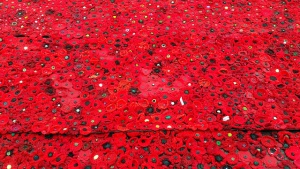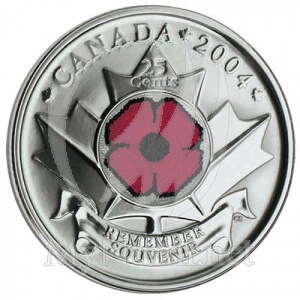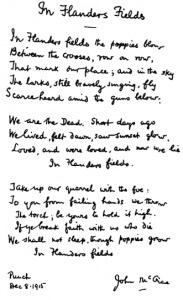
We’ve collected 6 little-known facts about the Remembrance Day poppy that you may find interesting:
1. The Royal Canadian mint issued a coin emblazoned with a red poppy in 2004 to commemorate the 100 year anniversary of the start of World War. This was the first coloured coin to be released into circulation in the world. Strangely, once-classified U.S government documents reveal that in 2007 US army contractors were so shocked by the coloured quarters released by Canada that they suspected that they were being used for “espionage purposes”. They stated that they looked odd and were filled with “something man-made that looked like nano-technology”.

2. The original British Legion poppies were designed so that veterans from the war could make them even if they had lost the use of one hand.
3. Poppies flourished on the battle grounds of the First World War I in France and Belgium as rubble from the fighting released lime into the ground causing the little red flowers to pop up around the gravesites of fallen soldiers.
4. “In Flanders Fields”, the poem from which the tradition originated, was almost thrown away. Lieutenant Colonel John McCrae was conducting the funeral of a fellow officer and looked around to see nothing but death, suffering and crosses marking the resting sites of his friends engulfed in a sea of poppies. He took some time and wrote the words of the famous poem but was unhappy with it and threw it away. A fellow officer picked it up a decided to send it to a handful of newspapers in Britain and later that year Punch decided to publish it.

5. Poppies are an international symbol of remembrance and are distributed in 53 commonwealth countries around the world including the UK, Canada and Australia as well as in non-commonwealth countries such as France, Belgium and The Netherlands.
6. In New Zealand, they wear poppies in April. This came about when the shipment of Poppies sent over for the first Armistice Day in November 1921 arrived late and so the soldiers decided to wait until ANZAC day (April 25th) the following year.
–
Alex worked in the Primrose marketing team, mainly on online marketing.
As a psychology graduate it is ironic that he understands plants better than people but a benefit for the purpose of writing this blog.
An enthusiastic gardener, all he needs now is a garden and he’ll be on the path to greatness. Alex’s special talents include superior planter knowledge and the ability to put a gardening twist on any current affairs story.
